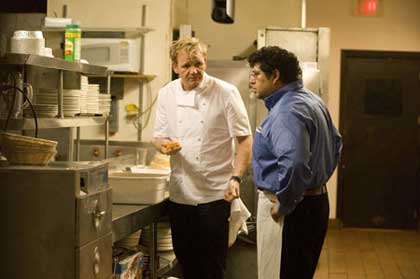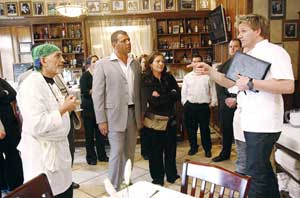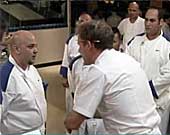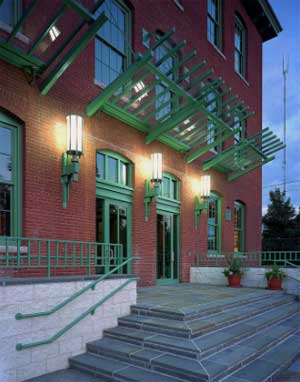
[Bianculli here: Eric Gould is an architect in Boston -- and the designer of this website, which is about to undergo a revamp, also at his hands. As we worked on it last weekend, he made a remark about Gordon Ramsay, and how watching Kitchen Nightmares has changed the way he runs his business. "That's great! Write that as a guest blog," I said. He did. And here it is. My guess is, it'll generate LOTS of comments...]
Standards, Yes?
When "Kitchen Nightmares" Meets The Office
Followers of Kitchen Nightmares (Friday nights at 9 ET, Fox) know well that the host, Gordon Ramsay, is a wound-up, caffeinated mix of successful restaurateur, life coach and perverse provocateur. He can turn very bad restaurants into high-functioning and very well-received ones.
Most often, his most important fix is on the restaurant owners' psyches, and their generally mistaken belief that although there are no customers, most everything they're doing is just about fine. Ramsay's surprising talent is assessing and unmasking -- usually with very quick, uncanny accuracy -- the true troubles: bad staff, frozen food, unwieldy in-laws.
In the end, he persists, and accomplishes the what-seemed-impossible turnaround of even the most inept operation. Once difficult and egotistical Owners blossom into compliant and grateful ones, with smooth-running dinner-hour rushes of happy diners. But these are not just restaurant transformations. They are business turnarounds, too.

Ramsay pulls them through, not only with a peppering of his infamous kitchen tirades (there are F-bombs bleeped out every thirty seconds or so), but often with surprising perception and compassion. He takes the egotistical Owner and soberly lectures him or her that without his help, they will be under in six months. They are doomed to fail, and must change.
He often takes them to look at the local, fresh food being grown all around them, and to put it on a very streamlined, fresh-cooked menu, forever barring the suppliers of frozen foods. He sees fear in cocky bluster, and disarms even the most stubborn with calm, often painful but direct advice. He shows them how staff might be taking advantage of them. He teaches them how to learn all of the things they should have learned before ever opening a restaurant.
He breeds understanding and success, even though the audience may feel that some of these stooges, harvested by the producers for a reality show, aren't really deserving of Ramsay's help or his enormous expertise.

To be honest, I was not a big fan of his. Ramsay's other Fox show, Hell's Kitchen, is a reality-competition show starring a wide sampling of underperforming kitchen "talent" that Ramsay gets to hover over each week and verbally reduce to a burnt slick of Ragu. It's a guilty pleasure for those who enjoy a four-letter flambe of uncomprehending slackers, but not good for much else. Truthfully, I thought he was the biggest misanthrope ever to get a TV show since Morton Downey, Jr.
Thankfully, we see more of Ramsay's true side on Kitchen Nightmares. What is pure firestorm on Hell's Kitchen turns out to be a man who is passionate about delivering the best food possible, and coaxing people -- usually dysfunctional partners or families -- back from the brink. It's always an amazing, if not enriching, transformation to watch.
One night, the thought struck me that what I was really watching wasn't just failing restaurants, but failing businesses. Ones being unmasked for what they were: Owners who had lost their passion, staffs out of control, no responsibility, desperate measures, and more money going out than coming in. Most were either in panic, dumbly frozen without a clue, or in anarchy.
It seemed to me that it didn't make a difference if the business was a restaurant or a small operation like mine, an architect's office. The rules for failure and their fixes applied to both. And probably, for that matter, to all businesses: Do what you do well, cut out what you don't, get rid of dead weight, simplify, deliver what you say you will, find your passion, charge less, deliver faster, better. And smile... your joy for your work will excite others.
And, absolutely, 'Have standards, yes???!?"

Ramsay talks about standards a lot, in that English way one asks the question and answers it in the same sentence. Never let something you know has been improperly prepared go out of the kitchen, even if it means making the diner wait a little longer. "Standards, yes?"
Never buy frozen or cheap food -- the customer can always taste the difference. "Standards, yes?" Find and keep employees who care about what they do. "Standards, yes?"
I started thinking back. A couple of my most dedicated guys were always on me to let go a couple of malcontents on the crew, who, although talented, weren't really team guys. I thought I was being the wise leader by showing tolerance for different personality types, but when I finally listened closely, I could see the dedicated guys were really being kept from doing what they wanted to be doing not just well, but excellently, with standards, yes???!?
Once the problem guys were gone, the others thrived. Drawings started coming out in better detail, in less time. There was a lighter air in the office. We were suddenly a team... a line of chefs, each doing their part and serving up a hot set of drawings, ones that met jobs on time and resulted in projects being built for budget.
On Kitchen Nightmares, restaurant interiors are made over, menu graphics are changed. Sometimes the front signs and canopies are redone, all in the spirit of not only making over the food, but the environment, the new mindset, the new vibe.

At Helicon Design Group, we redesigned the office identity kit. putting logos and stationery in bright orange blocks and modern lettering. We re-branded the website -- our public menu -- and started posting monthly updates on LinkedIn, so our closest vendors and friends got a message in their email every 60 days or so. We were now fresh in their minds, with news about projects we just finished and ones we were just starting.
We looked at the way our construction sets were being done, and revamped them, trying to be simple, more direct. We tried to stay ahead of projects, not work to catch up to them.
We woke up. "Standards, yes?"
We started to get compliments, from pretty tough customers, on our drawings and construction plans. Things were going better in the field. The projects were being done more or less for bid, with a minimum of change orders.
More important, we liked what we were doing again. And people liked us back.
We're still a small firm, and who knows what or where the next issues will come from as we grow larger. I'm not sure, but I know they're out there. The main thing is, there's a place to go to study how to strip things bare, cut away the bad parts, reinvent, and find a way to create and work excellently.
It's the kitchen.
--
 Eric Gould is an architect in Boston and Principal of Helicon Design Group. Having piled up shadow pursuits into public art, poetry, photography and graphic design, it seems he can now add television blogging to the list. Visit his Helicon Designs website by clicking HERE.
Eric Gould is an architect in Boston and Principal of Helicon Design Group. Having piled up shadow pursuits into public art, poetry, photography and graphic design, it seems he can now add television blogging to the list. Visit his Helicon Designs website by clicking HERE.